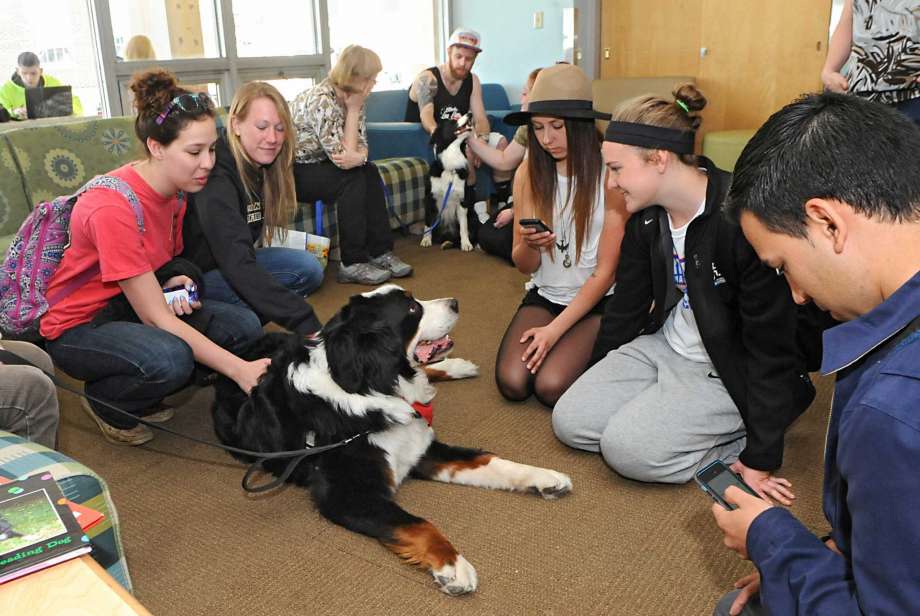SERVICE DOGS, EMOTIONAL SUPPORT DOGS, THERAPY DOGS: WHAT’S THE DIFFERENCE?
by Jan Reisen
Published on American Kennel Club website: July 31, 2019
Dogs have been aiding and working with humans since ancient times, in everything from farming to hunting to protection and more. Service dogs, emotional support animals, and therapy dogs all fulfill important roles in their aid to humans, but the terms are not interchangeable: each is specifically defined, both in terms of their jobs and their legal rights.
What Do Service Dogs Do?

As defined by the Americans with Disabilities Act (ADA), service dogs are individually trained to perform specific tasks and to work with people with disabilities. According to the ADA, disabilities can be “physical, sensory, psychiatric, intellectual, or other mental disability.” The work of the service dog must be directly related to the handler’s disability. These are just some of the things a service dog can do:
Guide dogs help blind people navigate in the world.
Hearing (or signal) dogs alert deaf people to sounds, such as a knock on the door or a person entering the room.
Psychiatric dogs are trained to detect and lessen the effects of a psychiatric episode.
Service dogs help those in wheelchairs or who are otherwise physically limited. They may open doors or cabinets, fetch things their handler can’t reach, and carry items for their handler.
Autism assistance dogs are trained to help those on the autism spectrum to distinguish important sensory signals, such as a smoke alarm, from other sensory input. They may also alert their handler to repetitive behaviors or overstimulation.
Service dogs that are trained to recognize seizures and will stand guard over their handler during a seizure or go for help.
What Rights Do Service Dogs Have?
The ADA mandates that service dogs have full public access rights, which means they are allowed to go places where are animals are forbidden. They can be brought into restaurants, stores, libraries, and other public spaces. They must be permitted in housing, even if other pets are not allowed. Service dogs are also allowed on airplanes and other public transport. One caveat: each airline has its own rules regarding service dogs. Most require that the dog sits on the traveler’s lap or at their feet. Dogs cannot block the aisle or sit in the emergency exit row. Service dogs are exempt from the pet fees that airlines charge.

What Do Emotional Support Animals Do?
Emotional support dogs are not considered service dogs under the ADA. They may be trained for a specific owner, but they are not trained for specific tasks or duties to aid a person with a disability, and this is the main difference between ESAs and service dogs. This doesn’t minimize the support these dogs provide for people with a psychological disorder. They’re considered companion animals and ease anxiety, depression, some phobias, and loneliness. In order to be considered an emotional support dog, it must be prescribed by a mental health professional for a patient with a diagnosed psychological or emotional disorder, such as anxiety disorder, major depression, or panic attacks.
What Rights Do Emotional Support Animals Have?
Unlike service dogs, ESAs have only limited legal rights and those typically require a letter of diagnosis from the owner’s doctor or psychiatrist. While they don’t have unlimited access to public spaces, the Fair Housing Act mandates “reasonable accommodations” for emotional support animals even in buildings that don’t allow pets. The Air Carrier Access Act requires airlines to allow ESAs on flights, but travelers must have a letter from a doctor or licensed therapist. There may be additional requirements as well. Because so many people abuse the concept of an emotional support animal, including the traveler who tried to bring an “emotional support peacock” on board a United Airlines flight, airlines are tightening restrictions on emotional support animals. We can expect other commercial and public spaces to follow.

What is a Therapy Dog?
Therapy dogs play a different helping role than service dogs and emotional support animals. They aren’t trained to live with a specific handler. Rather, these are dogs that — with their human teammate (often the dog’s owner) — volunteer in clinical settings, such as hospitals, mental health institutions, hospices, schools, and nursing homes, where they provide comfort, affection, and even love in the course of their work. Therapy dogs are trained to be comfortable in new environments and to interact with different people. They should have a calm temperament, be unfazed by unfamiliar noises and movements, be comfortable being handled, and love people.
Do Therapy Dogs Have Legal Rights?
Although they are defined as comfort dogs and often used in therapeutic settings, therapy dogs are not considered service dogs under the ADA and don’t have the same legal right to access in public spaces. There are no uniform state or national rules that regulate and certify therapy dogs, and different organizations have different guidelines. As a general rule, therapy dogs should be trained, insured, and licensed by the non-profit that’s offering their services.
Can My Dog Be a Therapy Dog?
If you’re interested in volunteering and think your dog may be a great candidate to be a therapy dog, organizations like the Alliance of Therapy Dogs test dog for their suitability and, if accepted, have guidelines that must be followed.
While it doesn’t certify therapy dogs, the AKC Canine Good Citizen (CGC) program offers their training program to organizations, and the CGC test is often a prerequisite required by therapy dog organizations.
